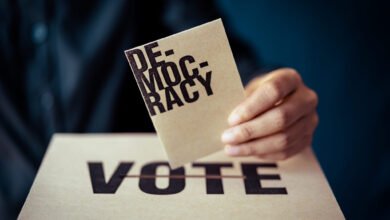Now, clearly, is no time to raise the gaming tax • Nevada Current

“Our Las Vegas Strip Resorts and MGM China set new all-time records” in 2023, MGM Resorts International CEO Bill Hornbuckle gushed Tuesday in a statement announcing the corporation’s fourth quarter and full year earnings.
MGM’s numbers are indeed pretty splashy. Net revenues for the fourth quarter of 2023 ($4.4 billion) were 22% higher than the same quarter in 2022, and net revenues for all of 2023 ($16.2 billion) were 23% higher than the prior year.
Guess that F1 thing was worth the trouble after all.
Oh wait. The company reports that increases in the corporation’s quarterly and yearly net revenue are “due primarily to an increase in revenue at MGM China.” At least the yearly revenue increase was also due to additional non-gambling revenue on the fabulous Las Vegas Strip.
For the F1-inhabiting fourth quarter however, net revenue on the Strip was decidedly less splashy than the numbers Hornbuckle touted – $2.4 billion, as opposed to $2.3 billion in the fourth quarter of 2022.
And there, evidently, is the spectacular F1 windfall the resort industry and its minions in the tourism-promotional industrial complex, aka the Las Vegas Convention and Visitors Authority, have been crowing so much about. All that chaos was created, and all that inconvenience inflicted, in the heart of the metropolitan area so the biggest company in town could make 4% more revenue in Las Vegas than it made over the same three months in 2022.
The math whizzes among you will note that 4% is almost as much as 5%, which is how much MGM reported net revenues increased in its Las Vegas properties through the first nine months of 2023 compared to 2022. For the record, of last year’s 52 weeks, roughly 51 of them were, for visitor volume purposes, F1-less.
Perhaps the resort industry will excuse a casual observer for suspecting that however good last year was for the industry, F1’s economic impact may not have been as supercalifragilistic as advertised.
Still, MGM’s overall earnings were, as the company is delighted to tell its shareholders, record-setting.
So what does MGM do with all that money anyway?
Glad you asked.
One thing it does is buy back the company’s own stock, because taking shares off the market (usually) raises the stock price, benefiting shareholders while enriching top corporate executives who are pretty heavy stockholders themselves and whose compensation packages are almost always tied to the share price.
Take Hornbuckle as an example. In 2022, $10 million of his $16.3 million compensation was in the form of MGM stock.
In the fourth quarter of 2023, MGM bought back $629 million of its own stock, which brought the company’s stock buyback total over the whole year to $2.3 billion. Though not yet two full months into 2024, MGM has already spent $249 million on buybacks.
Add that to earlier repurchases, and as MGM boasted to grateful shareholders Tuesday, the company’s buybacks have totaled $7.1 billion since 2021.
That’s about three times as much as the entire gambling industry has paid in Nevada gaming taxes over the same period.
Topping out at 6.75%, Nevada of course has the nation’s lowest tax rate on gambling revenue. Nevada’s tax rate is a fraction of what it is in Maryland (20 to 40%), Michigan (19%) or New York (30 to 45%), all states where MGM somehow manages to operate casinos anyway.
The tax rate paid by average Nevadans when they buy pet food, a used car, or a sandwich for lunch is 24% higher than the tax rate the world’s largest casino corporations pay on Nevada gambling revenue.
That’s one of the reasons Nevada’s tax structure is the nation’s 5th most regressive.
At least when MGM pays its gaming taxes, the money stays in Nevada.
The money MGM spends on stock buybacks, by contrast, just flies up into the air – look, there it goes – on its way to enrich shareholders around the nation and the world. Except maybe for whatever tiny portion of it Hornbuckle might spend ‘round here. If any.
Yes, MGM – and the rest of the gambling industry – could easily afford to pay more in state taxes. That’s always been true.
But now, clearly, is no time to raise the gaming tax. As every resort industry executive and apologist in town and every influential elected official in the state have made clear again and again, as far as they’re concerned, it never is.





